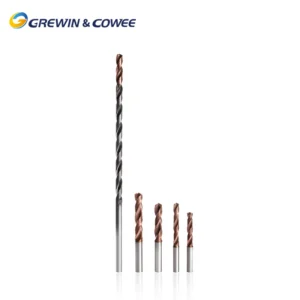Table of Contents
ToggleSolid Carbide Drills
When it comes to precision machining, choosing the right tools can make all the difference. Among these tools, the solid carbide drill stands out as a preferred option for many professionals in various industries. With its unique properties and capabilities, it’s essential to understand what solid carbide drills are, their advantages, and where they can be applied effectively.
Understanding Solid Carbide Drills
Solid carbide drills are made entirely from carbide, a highly durable material known for its toughness and wear resistance. Unlike high-speed steel (HSS) drills, which consist of a blend of iron, carbon, and other elements, solid carbide drills are crafted from a solid block of carbide. This construction provides several inherent advantages, making them ideal for precision machining.
For instance, when drilling into hard materials such as titanium or stainless steel, a solid carbide drill will maintain its sharpness longer than its HSS counterpart. This is because carbide is much harder than steel, allowing for more efficient drilling without frequent replacements. A manufacturer faced with the challenge of increasing their productivity learned that switching to solid carbide drills reduced their downtime drastically. They could now complete tasks faster, leading to improved overall efficiency.
Benefits of Solid Carbide Drills
1. Enhanced Durability: One of the most significant advantages of solid carbide drills is their durability. They can withstand high temperatures and pressures, which often occur during tough machining operations. For example, a toolmaker tasked with creating intricate components found that using solid carbide drills for high-speed machining of complex shapes reduced tool wear significantly, allowing for longer intervals between tool changes.
2. Precision and Accuracy: Solid carbide drills are renowned for their precision. The inherent stability of carbide ensures that the drill maintains its shape even under extreme conditions. This characteristic is crucial when creating fine and precise holes, which are often required in aerospace and automotive components. For instance, a company in the aerospace sector utilized solid carbide drills to achieve tolerances of just a few micrometers, essential for the reliability of their flight components.
3. Versatility: Solid carbide drills can be designed to drill holes of various sizes and shapes, making them highly versatile. Depending on the task, these drills can vary in diameter and length, catering to different precision machining needs. A furniture manufacturer found that solid carbide drills allowed them to drill clean holes in hard wood and composite materials, enhancing their product quality.
4. Faster Production Rates: The ability of solid carbide drills to maintain sharpness over time leads to faster production rates. As mentioned earlier, they reduce the frequency of changes, which lowers downtime. For example, a local machine shop reported a 30% increase in output after integrating solid carbide drills into their workflow. This boost in productivity not only led to more completed projects but also increased customer satisfaction.
Application Areas for Solid Carbide Drills
Solid carbide drills are employed across various industries due to their unique properties. Here are some specific application areas:
Aerospace: Precision and reliability are crucial in aerospace components. Solid carbide drills are frequently utilized for drilling lightweight materials like aluminum and titanium, which are common in aircraft manufacturing.
Automotive: In the automotive sector, solid carbide drills help create complex parts with fine tolerances. For instance, they are used in the production of engine blocks and transmission pieces, where accuracy is vital for performance and safety.
Medical Devices: The medical equipment industry demands high precision and cleanliness, particularly in manufacturing devices that will be used in surgeries. Solid carbide drills ensure the high-quality production necessary to meet rigorous standards.
Tool and Die Making: In tool and die manufacturing, solid carbide drills are indispensable. They provide the precision required to create dies that can withstand repeated use over time without significant wear.
Making the Right Choice
When purchasing a solid carbide drill, customers should consider several factors, including diameter, length, coating, and specific applications. Each of these elements can affect the drill’s performance based on the materials being worked on and the complexity of the task at hand. For example, a coating like TiN (Titanium Nitride) can significantly increase the lifespan of the drill by reducing friction and heat buildup, further enhancing its capabilities.
Before deciding, it’s wise for professionals to analyze their specific needs carefully. Asking questions such as “What materials will I be drilling?” and “What tolerances are required?” can lead to a more informed choice that results in better machining outcomes.
Conclusion
In conclusion, the solid carbide drill is a powerful tool that offers numerous advantages in precision machining. From enhanced durability and precision to versatility and faster production rates, these drills prove invaluable across various industries. Understanding their benefits and applications can significantly impact operations, leading to increased productivity and quality. As you consider your next machining project, remember the attributes of solid carbide drills and how they can optimize your work. Incorporating these tools into your machining arsenal could be the change you need for superior results. Solid carbide drills are not just tools; they are essential partners in precision engineering.
